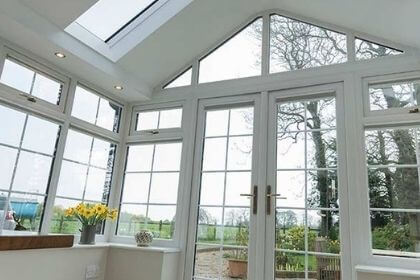Conservatory heating is a topic that has been debated for decades. A conservatory is a great way to add value and space to your home, but it’s also important to make sure you’re heating it in the winter.

Many people find it hard to believe how much heat conservatories need, but the amount of heat required varies depending on the size and shape of your conservatory.
To help you figure out what size heater will work best for your home, we’ve put together this helpful guide.
If your conservatory has at least 10 windows or doors that face outwards, then you’ll need about 100 BTU per square foot of floor area for standard heaters units. Conservatories with less than nine windows will require around 30 BTU per square foot.
Conservatories require between 30 and 50 BTU per square foot of floor space, with more added for steeper roofs.
if you want an idea of how much heat your conservatory needs, we recommend choosing one that has around 15,000-30,000 BTUs depending on the size.
The calculation is based on the floor area only, so be sure to add up all of your square footage when you’re figuring out how much heat you’ll need.
If your conservatory has a steep roof, then this will require more energy for heating in winter than one with standard flat roofs. To account for this difference, add another 50 BTU per foot for every 20-degree pitch of the roof.

If you don’t want to go through all these calculations, we recommend purchasing a heater with an energy rating between about 15,000 and 30,000 BTU (British thermal units) depending on how large your conservatory is.
This amount should provide adequate heating for most conservatories.
What are British Thermal Units
British thermal units, BTUs or Btus, are a measure of energy. These numbers can vary depending on where you live and what type of insulation your house has installed.
For those who don’t know the metric system, they look like this: 1BTU=1055joules.
It’s important to note that these numbers apply only to heating and not cooling your home.
How to convert British Thermal Units into Joules
British thermal units are a measure of heat energy, but they’re not the same as joules. A British thermal unit is equivalent to 1055 J.
This is based on the International System of Units (SI) for energy conversion purposes, so it’s important to use this formula if you’re using SI units.
If you have an appliance that says it uses 5400 BTUs per hour, then this would be equivalent to 54000 J/hour or about 2.5 kW.
If you’re looking to convert BTU into joules, the formula is: 1 British thermal unit (BTU) x 0.293 = 1 kilojoule (kJ). You can also use this equation in reverse by converting from joules to BTUs and then dividing by 0.293.
Converting from one measurement system to another isn’t always easy but it’s a necessary skill for those of us who are involved with any sort of energy production or conversion process.
How can you visualise 1 British Thermal Unit
There are a ton of units in the world that can be confusing to visualise. One of them is the British thermal unit or Btu.
One BTU is equal to approximately 1055 joules of energy, which may not seem like much but when multiplied by the number of BTUs needed for your space will give you an idea of how many fireplaces or furnaces you need to power your home.
It’s essential for homeowners to understand this measurement when it comes to their homes because they use it when calculating heating loads, which determines how much energy they will need in order to maintain an optimal indoor temperature.
In order to get a sense of how many BTUs you’ll need in your home, it’s best to compare them to something that is more familiar. For example, one Btu is equivalent to the amount of energy needed from an average-sized candle.
BTU is a measure of energy or heat power that can be used to understand how much energy an appliance will use as well as its efficiency rating.
For example, a radiator with a BTU output of 100,000 would require more fuel than one at 50,000 but would also be more efficient because less fuel would be needed to achieve the same heating result.
How many British Thermal Units in a kilowatt
The amount of British thermal units (BTUs) in a kilowatt is the energy measurement that tells you how much power your appliances will use.
The utility bill for a home can make up a significant portion of monthly expenditures and it’s important to understand how much energy you’re using. For example, 1-kilowatt hour (kwH) equals 3,412 British Thermal Units (Btu).
If you’re looking to reduce your energy costs, knowing this conversion rate can help you make informed decisions about the purchase and running costs of appliances such as radiators, water heaters, and ovens.
